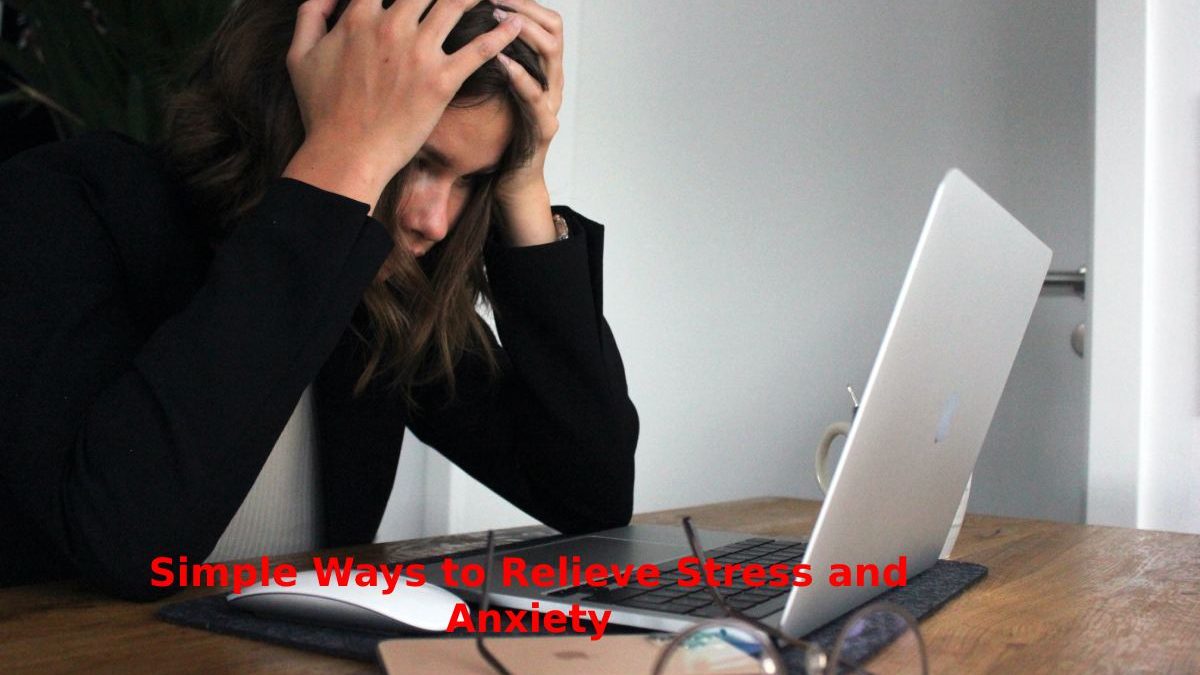Stress and anxiety are shared experiences for most persons. In fact, 70% of adults in the US say they experience stress or anxiety every day.
Table of Contents
Some Simple Methods to Relieve Stress and Anxiety.
Exercise

Exercise is one of the most vital things you can do to combat stress. It may look counterintuitive, but exercising can relieve mental stress by putting your body under physical pressure.
The benefits are most significant when you exercise regularly. People who exercise regularly are less likely to experience anxiety than those who don’t.
There are several reasons for this:
- Stress Hormones: Over the long term, exercise reduces the body’s stress hormones; like cortisol. It also helps release endorphins, mood-boosting chemicals that act as a natural pain reliever.
- Sleep: Exercise can also progress sleep quality, which can be negatively affected by stress and anxiety.
- Confidence – Exercising regularly can help you feel more competent and confident in your body, allowing mental well-being.
Try to find an exercise repetitive or activity that you enjoy, such as hiking, dancing, mountain climbing, or yoga.
Activities like walking or jogging that include repetitive activities of large muscle groups can reduce stress.
Consider Additions
Several dietary additions promote the reduction of stress and anxiety. Here is a summary of some of the most common:
- Lemon balm: Lemon balm belongs to the mint family and has been studied for its anti-anxiety effects.
- Omega-3 fatty acids: A study showed that medical students receiving omega-3 additions practised a 20% reduction in anxiety signs.
- Ashwagandha: It is a herb used in Ayurvedic treatment to treat stress and anxiety. Several studies suggest that it is effective.
- Green Tea: Green tea is rich in polyphenol antioxidants which provide health benefits. It can reduce stress and anxiety by increasing serotonin levels.
- Valerian: Valerian root is a popular sleep aid due to its calming effect. Contains valerenic acid, which modifies gamma-aminobutyric acid (GABA) receptors to reduce anxiety.
- Kava: Kava is a psychoactive member of the pepper family. It was used in the South Pacific as a sedative and is increasingly used in Europe and the US to treat moderate stress and anxiety.
Decrease your Caffeine Intake
Caffeine is a stimulant establish in coffee, tea, chocolate, and energy drinks. However, high dosages can raise anxiety. As a result, people have altered thresholds for how much caffeine they can accept.
If you find that caffeine makes you nervous or anxious, you should consider stopping. Although many lessons show that coffee can be healthy in moderation, this is not true for everyone. In general, five or fewer cups a day is considered a moderate amount.
Some dietary supplements can interact with medications or cause side effects, so see a doctor if you experience any discomfort.
Notice Something
One way to contract stress is to write things down. While recording what stresses you out is one way to focus, writing down what you’re grateful for is another. Gratitude can help reduce stress and anxiety by focusing your thoughts on the positive things in your life.
Spend Time With Friends and Family
Social care from friends and family can help you through stressful times. Being part of a network of friends provides you with a sense of going and self-esteem, which can help you through difficult times.
One study found that for women in particular, spending time with friends and children helps release oxytocin, a natural relaxant. This effect is called “attention and friendship” and is the opposite of the fight or flight response.
Remember that both men and women benefit from friendships.
Learn to Avoid Procrastination
Another method to control your stress is to keep your priorities in check and stop procrastinating. Procrastination can cause you to act reactively and stumble in getting everything done. This can cause stress, which negatively impacts your health and the quality of your sleep.
Make a habit of making a to-do list, organized by priority. Set realistic deadlines and work on your list. Work on the things you need to do today and do them nonstop. Jumping from one task to another or doing several at once can also be stressful.
Attend a Yoga Class
Yoga has become a general method of stress relief and exercise for people of all ages. Although yoga styles differ, most share a common goal: to unite body and mind. Yoga achieves this primarily by increasing awareness of the body and the breath.
Some lessons have looked at the effects of yoga on mental health. Overall, research has shown that yoga can improve mood and may even be as effective as antidepressants for treating depression and anxiety.
Conclusion
Stress is a sense of diplomatic or physical tension. It can come from any event or thought that makes you feel frustrated, angry, or nervous. Stress is your body’s reaction to a challenge or demand. In short bursts, stress can be positive, such as when it helps you avoid danger or meet a deadline.
Also Read: Why is it Important to do Cardio, And what Benefits does it Bring?

